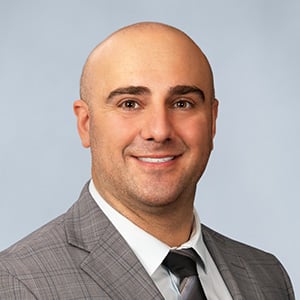Age-related macular degeneration
Age-related macular degeneration (AMD) is the deterioration of the macula, which is located in the center of the retina, and is responsible for sharp central vision. Macular degeneration is seen as early as age 55 but more commonly in older patients and causes gradual vision loss in the center of vision. Macular Degeneration is a leading cause of blindness in America, causing more people to go blind than cataracts and glaucoma combined.
What is the macula?
The macula is a small part of the retina, the thin layer of light sensitive tissue that is responsible for sending images to our brains. The macula specifically is responsible for sharp, central vision. The macula controls the part of our vision that allows us to read, drive, recognize faces and do fine detail work.
Types of macular degeneration
There are two distinct types of age-related macular degeneration (AMD). One type, called dry or “atrophic” AMD makes up for about 90% of all cases. The other type, wet or “exudative” AMD makes up for about 10% of all cases.
Dry AMD
is the beginning stage of AMD. Most cases of AMD are the dry type, with a small amount progressing into the wet type. Dry AMD progresses much more slowly than wet AMD.
Wet AMD
is the most advanced form of AMD. While wet AMD only accounts for 10% of all cases of AMD, it is responsible for 90% of all cases of blindness caused by the disease. Wet AMD occurs when the membrane underlying the retina thickens and then breaks. As a result, the macula loses oxygen flow, and the body responds by creating new, abnormal blood vessels. As these abnormal vessels grow, they often leak and bleed, causing scarring on the macula and vision loss.
AMD is a progressive disease, occurring in three stages:
- Early AMD: During this stage, symptoms are not noticeable. This is why eye examinations become increasingly important as we age. During an eye exam our doctor can often find the beginning of this disease before vision loss occurs.
- Intermediate AMD: During this stage, small amounts of vision loss may occur, but for the most part no symptoms are experienced.
- Advanced AMD: During this stage, central vision loss is apparent.
Risk factors
The main risk factor of AMD is simply aging. Other risk factors include genetics and smoking. If you have family members who have had AMD, you are at increased risk for developing it as well.
Treatment
There is no known cure for Macular Degeneration, although there are treatments that are believed to slow its progression. For dry AMD, doctors generally suggest lifestyle changes such as healthy diet and exercise. Research suggests that a diet high in antioxidants helps support the macular cells and slow the progression of macular degeneration. However, a specific nutritional formulation called the AREDS2 formula has been proven to slow the progression of AMD and is currently recommended for patients with dry AMD.
For wet AMD, injectable Anti-VEGF medications have been developed that stop the progression of the disease. VEGF stands for vascular endothelial growth factor. These drugs slow the growth and stop the leakage and bleeding from the abnormal blood vessels growing beneath the macula. Anti-VEGF medications usually stabilize vision and in many patients can cause visual improvement.
If you are concerned that you may have macular degeneration or would like a second opinion about your macular degeneration treatment and management options, call OCLI today for your appointment!
























